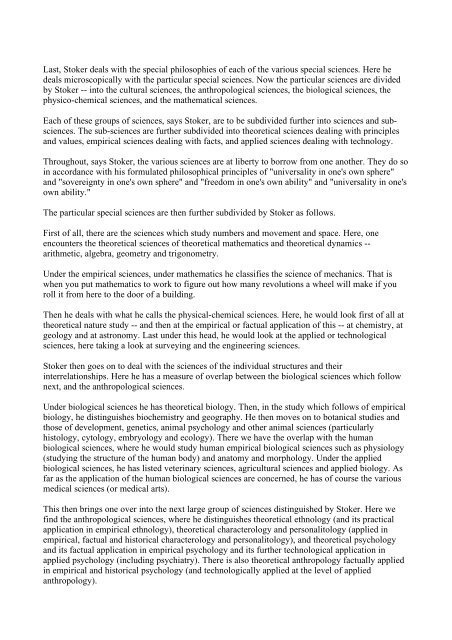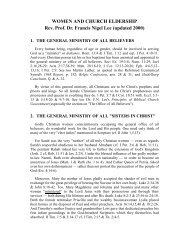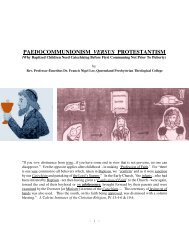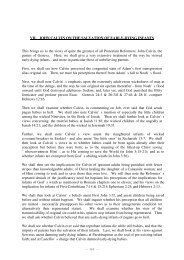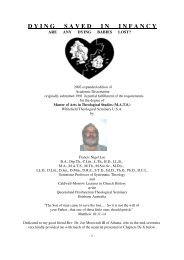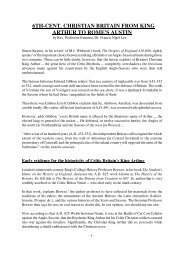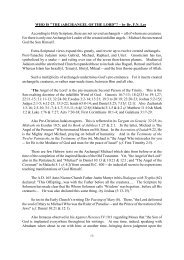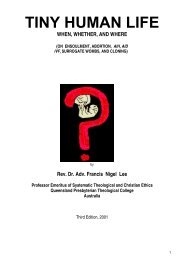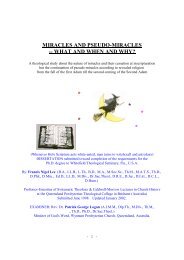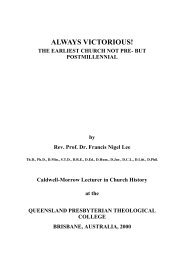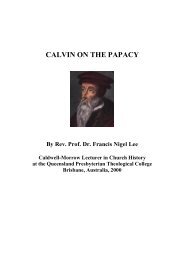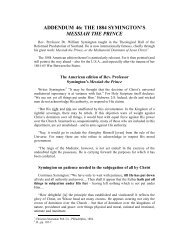Last, Stoker deals with the special philosophies <strong>of</strong> each <strong>of</strong> the various special sciences. Here hedeals microscopically with the particular special sciences. Now the particular sciences are dividedby Stoker -- into the cultural sciences, the anthropological sciences, the biological sciences, thephysico-chemical sciences, and the mathematical sciences.Each <strong>of</strong> these groups <strong>of</strong> sciences, says Stoker, are to be subdivided further into sciences and subsciences.<strong>The</strong> sub-sciences are further subdivided into theoretical sciences dealing with principlesand values, empirical sciences dealing with facts, and applied sciences dealing with technology.Throughout, says Stoker, the various sciences are at liberty to borrow from one another. <strong>The</strong>y do soin accordance with his formulated philosophical principles <strong>of</strong> "universality in one's own sphere"and "sovereignty in one's own sphere" and "freedom in one's own ability" and "universality in one'sown ability."<strong>The</strong> particular special sciences are then further subdivided by Stoker as follows.First <strong>of</strong> all, there are the sciences which study numbers and movement and space. Here, oneencounters the theoretical sciences <strong>of</strong> theoretical mathematics and theoretical dynamics --arithmetic, algebra, geometry and trigonometry.Under the empirical sciences, under mathematics he classifies the science <strong>of</strong> mechanics. That iswhen you put mathematics to work to figure out how many revolutions a wheel will make if youroll it from here to the door <strong>of</strong> a building.<strong>The</strong>n he deals with what he calls the physical-chemical sciences. Here, he would look first <strong>of</strong> all attheoretical nature study -- and then at the empirical or factual application <strong>of</strong> this -- at chemistry, atgeology and at astronomy. Last under this head, he would look at the applied or technologicalsciences, here taking a look at surveying and the engineering sciences.Stoker then goes on to deal with the sciences <strong>of</strong> the individual structures and theirinterrelationships. Here he has a measure <strong>of</strong> overlap between the biological sciences which follownext, and the anthropological sciences.Under biological sciences he has theoretical biology. <strong>The</strong>n, in the study which follows <strong>of</strong> empiricalbiology, he distinguishes biochemistry and geography. He then moves on to botanical studies andthose <strong>of</strong> development, genetics, animal psychology and other animal sciences (particularlyhistology, cytology, embryology and ecology). <strong>The</strong>re we have the overlap with the humanbiological sciences, where he would study human empirical biological sciences such as physiology(studying the structure <strong>of</strong> the human body) and anatomy and morphology. Under the appliedbiological sciences, he has listed veterinary sciences, agricultural sciences and applied biology. Asfar as the application <strong>of</strong> the human biological sciences are concerned, he has <strong>of</strong> course the variousmedical sciences (or medical arts).This then brings one over into the next large group <strong>of</strong> sciences distinguished by Stoker. Here wefind the anthropological sciences, where he distinguishes theoretical ethnology (and its practicalapplication in empirical ethnology), theoretical characterology and personalitology (applied inempirical, factual and historical characterology and personalitology), and theoretical psychologyand its factual application in empirical psychology and its further technological application inapplied psychology (including psychiatry). <strong>The</strong>re is also theoretical anthropology factually appliedin empirical and historical psychology (and technologically applied at the level <strong>of</strong> appliedanthropology).
This then brings Stoker to another overlap. This time it is that between the anthropological group <strong>of</strong>sciences and the cultural group <strong>of</strong> sciences. Here on the margin <strong>of</strong> these two, he has theoreticaleducation, its factual application in empirical and historical education, and its technologicalworkings-out in applied education. So too, he has the theory <strong>of</strong> history and the empirical andfactual history <strong>of</strong> mankind. Further: theoretical political science; its factual application in empiricaland historical political science; and its technological outworkings in the applied political sciences.Next follows theoretical sociology; its factual application in empirical and historical sociology, andits technological outworkings in applied sociology. <strong>The</strong>n, in his purely cultural groups <strong>of</strong> sciences-- he has logic and theoretical linguistics factually worked out in empirical and historical linguisticsas well as in the history <strong>of</strong> the sciences. He also has theoretical economics factually worked out inempirical and historical economics, and technologically worked out further in applied economics.Stoker then presents his critique <strong>of</strong> art -- theoretical art and aesthetics and art theory, factuallyworked out in empirical art and the history <strong>of</strong> art and in all the varieties and technologicalramifications in applied art.Next come theoretical jurisprudence -- factually worked out in empirical and historicaljurisprudence, and technologically worked out in applied jurisprudence. <strong>The</strong>n follows theoreticalethics, worked out factually in empirical and historical ethics; and theoretical religious science asworked out factually in empirical and historical religious science. So much, then, for Stoker'sarrangement <strong>of</strong> the various special sciences.I believe this scheme <strong>of</strong> Stoker's that we have just run through -- his theological sciences scheme,his philosophical sciences scheme, and then his scheme <strong>of</strong> the various special sciences (and finallythe interrelation between these three groups) to be extremely valuable. I myself see it as a reflectionin man's scientific research <strong>of</strong> the Ontological Trinity. I think it is important not only because itclearly shows the interrelationship <strong>of</strong> all <strong>of</strong> the special sciences, but also because it emphasises thenecessary interrelationship within each science -- <strong>of</strong> theoretical, historical, empirical and appliedscience.Stoker was born in 1899 -- in Johannesburg. In preparing this series <strong>of</strong> lectures, I came across apersonal letter written by the then seventy-two Stoker to me some nine years ago. It is dated 17thDecember 1971, and I would like to share it with you.He says: "Dear friend and brother Dr. <strong>Lee</strong>. Concerning the receipt <strong>of</strong> Dr. Van Til's Festschrift,Jerusalem and Athens, I am completely in the dark. I only received the Festschrift, and further don'tknow anything. <strong>The</strong> matters that you have just informed me about regarding the way in which it isbeing received and the report that it will possibly be republished, does my heart good. But, as I say,up till today, I am still in glorious ignorance."As far as my article in the Festschrift concerning Dr. Van Til is concerned, I did my very best todo him justice. Unfortunately, he is a much misunderstood figure. Your translation <strong>of</strong> my article onChristian Scholarship, I still have here. I would like to improve it technically and terminologically,here and there. But let us indeed regard it as final and settled that you will publish the translation."As a matter <strong>of</strong> fact, you can do it without any strings attached from me. Just do allow me to writea short Preface to the English translation that you have made, to thank you -- and also to point outto the reader that since writing this work, I have come to further insights and developments..."Until deep in January 1972, I will not be able to look through the corrected manuscript and send itback to you. Here, I am all bound up with two study items that I have to do for the Christian
- Page 1 and 2:
THE CHRISTIAN AFRIKANERSA Brief His
- Page 3 and 4:
God richly bless the following lect
- Page 5 and 6:
There have always been, and always
- Page 7 and 8:
But the only one they both appeal t
- Page 9 and 10:
Now Zuidema was a very great Dutch
- Page 11 and 12:
Dutch churches at the Synod of Dord
- Page 13 and 14:
station -- to help the Dutch ships
- Page 15 and 16:
It is a country dedicated to freedo
- Page 17 and 18:
1760 -- there was more and more dis
- Page 19 and 20:
with the Dutch. Many moved farther
- Page 21 and 22:
said: "The British have placed our
- Page 23 and 24:
financed by White money. It is buil
- Page 25 and 26:
Famous Boer Generals, left to right
- Page 27 and 28:
Three: Unannihilated: the Resurrect
- Page 29 and 30: (who had arrived in the country onl
- Page 31 and 32: of success.I may add that White Sou
- Page 33 and 34: General Beyers felt that those text
- Page 35 and 36: Balfour Declaration. The gist of it
- Page 37 and 38: Africa; treks on into the land both
- Page 39 and 40: Four: The Eschatology of Victory in
- Page 41 and 42: ide -- to use the instrumentality o
- Page 43 and 44: Christian National Calvinist Public
- Page 45 and 46: through constitutional process it h
- Page 47 and 48: I guess the best way to describe Sm
- Page 49 and 50: He was followed after his assassina
- Page 51 and 52: So the Scots came. I am going to sp
- Page 53 and 54: the Reformed Church in South Africa
- Page 55 and 56: ook on Hebrews. But his greatest wr
- Page 57 and 58: At that point, Du Plessis enquired
- Page 59 and 60: Yet quite apart from this high view
- Page 61 and 62: One last point. There is a tremendo
- Page 63 and 64: African Republic in 1902, the Cape
- Page 65 and 66: One of the most important Calvinist
- Page 67 and 68: Pellissier, who wrote on music and
- Page 69 and 70: perspective -- even while he minist
- Page 71 and 72: ever encountered by the Whites in S
- Page 73 and 74: Now the United States does not need
- Page 75 and 76: majority of the White citizens are
- Page 77 and 78: Now you will not find in any of Sto
- Page 79: Finally, Stoker argues that the so-
- Page 83 and 84: This Brummer just referred to, is a
- Page 85 and 86: Man was to rejoice in this nature (
- Page 87 and 88: enhanced. For, in the present, man
- Page 89 and 90: he declared, riddled with the ungod
- Page 91 and 92: Van der Waal is a very brilliant So
- Page 93 and 94: World War II when he was hiding fro
- Page 95 and 96: The Professor of Philosophy -- or I
- Page 97 and 98: glory.There are also Christian psyc
- Page 99 and 100: Then there are Christian criminolog
- Page 101 and 102: Massachusetts at Gordon- Conwell fo
- Page 103 and 104: well known -- is being pioneered in
- Page 105 and 106: people in South Africa. The South A
- Page 107 and 108: nature and of human culture (Prover
- Page 109 and 110: The parousia of Jesus Christ will i
- Page 111 and 112: more and more christianised. Later
- Page 113: END


